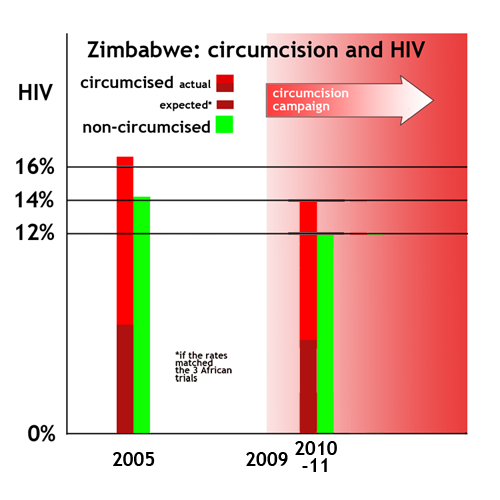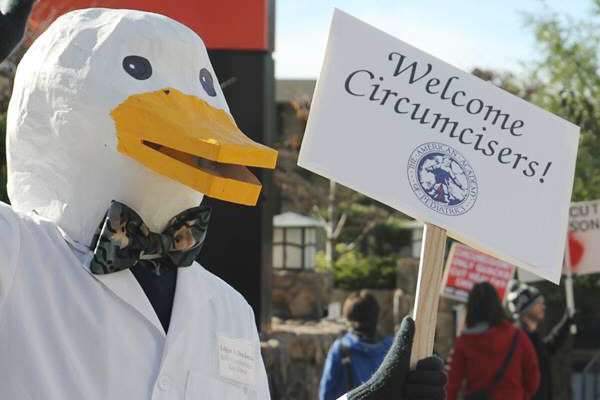|
Health News Digest
November 13, 2013
Circumcisions in Older Boys and Related Costs Skyrocket in Florida
(HealthNewsDigest.com) - GAINESVILLE, Fla. - Circumcisions in Florida boys over the age of 1 have increased dramatically in recent years, doubling costs to the state, a study by University of Florida Health surgical researchers shows.
Saleem Islam, M.D., an associate professor in the College of Medicine department of surgery's division of pediatric surgery, said he and his study collaborators believe the state's decision to terminate Medicaid funding for routine circumcisions in babies under 1 month old has led to the increase in circumcisions for older boys. The study was published in the September issue of the journal The American Surgeon.
[Is anyone surprised? More intact babies means more boys available to be circumcised later. It would be surprising if a fall in newborn circumcisions did NOT lead to a rise in later circumcisions.]
Islam said families should decide for themselves whether to have their sons circumcised, but emphasized that circumcision in the newborn period is preferable for several important reasons.
[NOT circumcising at all is preferable to either early or late - especially to the penis's owner - for several important reasons.]
"The benefits are that the child does not have to undergo general anesthesia, there is much less cost to public monies, it's safer for the kids to get it done [Ther is no evidence for this] and that's the right age, as well," he said.
[Not circumcising has all those benefits and more. And what does "the right age" mean?]
Because newborns require only local anesthesia for a circumcision, newborn circumcisions are safer and much less expensive. They also have a lower risk of complications. Circumcising older boys requires general anesthesia to ensure the patient remains still during the procedure. [Yes, a baby can simply be strapped down.]
Florida was one of numerous states to stop Medicaid coverage for routine newborn circumcisions after a 1999 report from the American Academy of Pediatrics said the procedure may not be medically necessary.
[May not be? 2,000,000,000 happily intact males in the world prove it IS not medically necessary.]
Islam explained that circumcisions can increase hygiene in the penis, and some uncircumcised males suffer from recurrent urinary tract or penile infections. Some parents will choose circumcision because of these potential problems or for religious or cultural reasons. Islam said he does not take a firm stance either for or against circumcision, but prefers for parents to decide.
The state cut off Medicaid coverage for the procedure in 2001. Many insurance companies also stopped paying for newborn circumcisions after the report. Funding remains available for circumcisions in older males when the procedure is deemed medically necessary, such as when repeated infections occur.
In 2012, the American Academy of Pediatrics reversed its stance on routine newborn circumcisions, citing research indicating they may help protect against HIV and provide other benefits. [They did not reverse their stance, nor recommend it, they just shifted their collective bottom on the fence.]
UF Health researchers' study of data from 2003 to 2008 shows publicly funded circumcisions increased at a rate more than six times greater than the increase in privately funded circumcisions. They also cost approximately $111.8 million over the five-year time period, an amount estimated by medical facility charges during the study period. Fees for health care providers were excluded from the study, meaning the actual amount paid for the procedures was probably greater. The study results also showed that circumcisions in boys over age 1 were more common each year than those performed on newborns.
[What's missing here is, what proportions of babies and older boys were circumcised before and after funding was ended? When funding is ended and fewer boys are circumcised, the vast majority never need to be circumcised, saving public funding. (Even fewer are ever circumcised where circumcision has not been customary for more than a generation, doctors or their partners have foreskins and they know its value, they are taught more about the foreskin than how to cut it off, and their anatomy texts actually show the foreskin.)]
By 2008, yearly Medicaid costs for circumcision in boys through age 17 reached $33.6 million, compared with $14.9 million in 2003. Meanwhile, private charges for circumcisions in Florida rose from $9.3 million to $14.1 million. Circumcisions in 2008 accounted for 30 percent of the estimated total costs for the procedure during the five-year window.
Islam said the increase in circumcisions among older boys likely stemmed from parents, supported by referring physicians, who had hygiene or medical concerns, but were unable or unwilling to pay for the procedure during the newborn period. UF Health pediatric surgeons noted they had talked with some of their own patients' parents about the decision to have an older boy circumcised and found that many parents would have opted for newborn circumcision if public funding were available.
[So what? Doubtless many parents whose son's DIDN'T have issues would have opted to cut them if the taxpayer paid for it.]
The American Academy of Pediatrics' new stance on the issue may lead states and insurance companies to restore funding for the procedure in newborns, a change Islam would welcome.
"It would make a lot of sense to offer it (newborn circumcision) to families who otherwise perhaps may not be able to afford it," he said, "and then say, ‘Here, we are offering it to you when your child is a newborn. You have a choice to make here. If you choose to get it done now, there are a lot of benefits over having it done later.'"
[And he says he's not pro-circumcision....]
|




